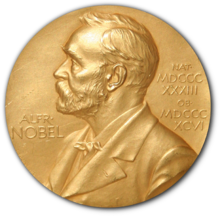
Back Nobelprys vir Chemie Afrikaans Nobelpreis für Chemie ALS جائزة نوبل في الكيمياء Arabic جايزة نوبل فى الكيميا ARZ Premiu Nobel de Química AST रसायन शास्त्र में नोबेल पुरस्कार AWA Kimya üzrə "Nobel" mükafatı Azerbaijani Нобелеўская прэмія па хіміі Byelorussian Нобэлеўская прэмія ў галіне хіміі BE-X-OLD Нобелова награда за химия Bulgarian
| Nobel Prize in Chemistry | |
|---|---|
 | |
| Awarded for | Outstanding contributions in chemistry |
| Location | Stockholm, Sweden |
| Presented by | Royal Swedish Academy of Sciences |
| Reward(s) | 11 million SEK (2024)[1] |
| First awarded | 1901 |
| Last awarded | 2024 |
| Currently held by | David Baker, Demis Hassabis and John M. Jumper (2024) |
| Most awards | Frederick Sanger and Karl Barry Sharpless (2) |
| Website | nobelprize.org/chemistry |
The Nobel Prize in Chemistry (Swedish: Nobelpriset i kemi) is awarded annually by the Royal Swedish Academy of Sciences to scientists in the various fields of chemistry. It is one of the five Nobel Prizes established by the will of Alfred Nobel in 1895, awarded for outstanding contributions in chemistry, physics, literature, peace, and physiology or medicine. This award is administered by the Nobel Foundation, and awarded by the Royal Swedish Academy of Sciences on proposal of the Nobel Committee for Chemistry which consists of five members elected by the Academy. The award is presented in Stockholm at an annual ceremony on 10 December, the anniversary of Nobel's death.
The first Nobel Prize in Chemistry was awarded in 1901 to Jacobus Henricus van 't Hoff, of the Netherlands, "for his discovery of the laws of chemical dynamics and osmotic pressure in solutions". From 1901 to 2023, the award has been bestowed on a total of 192 individuals.[2] The 2023 Nobel Prize in Chemistry was awarded to Moungi G. Bawendi, Louis E. Brus, and Alexei I. Ekimov for the discovery and development of quantum dots. As of 2022[update] only eight women had won the prize: Marie Curie (1911), her daughter Irène Joliot-Curie(1935), Dorothy Hodgkin (1964), Ada Yonath (2009), Frances Arnold (2018), Emmanuelle Charpentier and Jennifer Doudna (2020), and Carolyn R. Bertozzi (2022).[3]
- ^ "The Nobel Prize amounts". The Nobel Prize. Archived from the original on 20 July 2018. Retrieved 9 October 2024.
- ^ "Facts on the Nobel Prize in Chemistry". nobelprize.org. Archived from the original on 8 March 2017. Retrieved 5 October 2023.
- ^ "The Nobel Prize in Chemistry". The Nobel Prize. Archived from the original on 25 February 2024. Retrieved 6 October 2022.